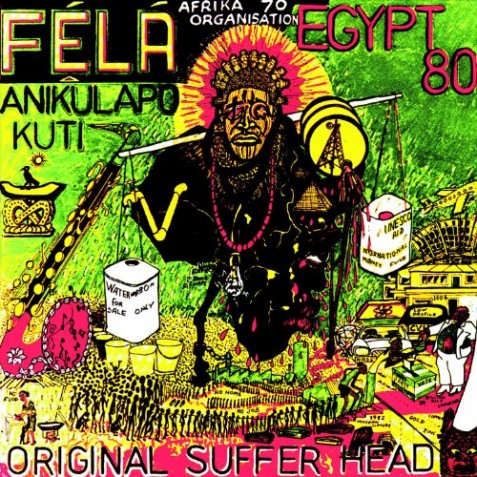Fela Kuti & Egypt 80 – Original Sufferhead
Fela Kuti & Egypt 80 – Power Show Pt. 1
“I want to tell you my brothers want to beat the truth, I want to knock some truth right into your heads…we must be ready to fight…find out for yourself” — Fela Kuti – “Original Sufferhead”
With so much Fela on the mind because of the “Power Show” 7 Pack we had available during KPFK’s fundraiser it seems only fitting that I spend a little time talking about this music and about the man. More than a few people shy away from Fela’s later work with his second afro-beat group Egypt 80. I think a lot of the lack of enthusiam for these later records has to do with the terrible production on several (Army Arrangement being the main culprit…the only Fela record it seems record stores generally have and it’s the one Fela record no one in their right mind should want in the original) of these later period albums. One of the great benefits of having Fela’s music reissued and remastered has been a second look at many of these later records (point in fact “Army Arrangement” is actually a fantastic album and song, now that it’s been cleaned up and all of Laswell’s studio histrionics are stripped away).
One record that really needed no remastering and stands as one of the best late period Fela records (only bested by Beast Of No Nation from 1989, which is incidentally my single favorite Fela record) is Original Sufferhead. Released in 1982, his first album with Egypt 80, “Original Sufferhead” and the flipside “Power Show” (here edited into just an instrumental version, you’ll have to get Fela’s indictment of small time officials who throw their “power” around on the full CD, which also includes International Thief Thief aka I.T.T.) have all the hallmarks of Fela’s legendary style and sound. The new group Egypt 80 lays down an intricate and funky back beat punctuated by Fela’s saxophone and organ. The mood early on is a bit playful, with the upbeat beat and Fela’s stated desire to “Sing it nice and together” before some call and response between the instruments and the singers. But eventually Fela gets down to business. He wants to bring attention to the main problems that face Africa as a continent and Nigeria in particular.
“Water, Light, Food, House,” the basic necessities of life and things that many people take for granted where these things are plentiful, such as in the US. In 1982 and here still in 2011 these things are not so plentiful in much of Africa. But, as Fela details, one by one in detail, this is not because they do not exist in Africa. Instead the water, energy and food problems of Africa are largely created because the people do not control these resources. For example, as Fela details in reference to food, where the “Big Big People” in Corporations plant food and goods such as cocoa, brown nuts and rubber which are then sold outside of Africa, but the Africans have to buy their rice from Brazil, Thailand and elsewhere instead of being able to use their own land to produce the food they need. The housing matter is a different matter as Fela says himself in the song. Housing seems more tied to the general poverty of many people in Africa, poverty that if the resources already described connected to water, energy and food were not largely taken away from Africans, either by multi-national corporations or the despotic leaders of these countries, would not exist. Africa is a rich land, but the unequal distribution of power and resources leads it to be “underdeveloped” and its people to “live like servants” and “sleep inside of dust-bins.”
Part of the reason I felt like this record in particular was a good one to highlight at this very moment is that it seems to encapsulate so much about what is going on right now in N. Africa and parts of the Middle East, where people are tired of how things have been and no longer are willing to accept their oppression at the hands of despots who continue to enrich themselves personally while leaving their people destitute. It is for this reason that Fela and Egypt 80 say “Original Sufferhead Must Go!” and the people must be able to control their own destinies. As history continues to unfold, let us hope that this vision will come to pass and the people will finally be free as Fela so longed for them to be.

